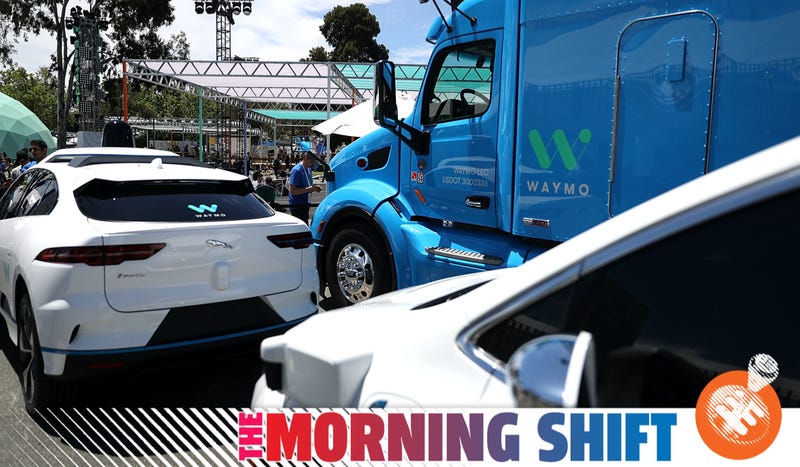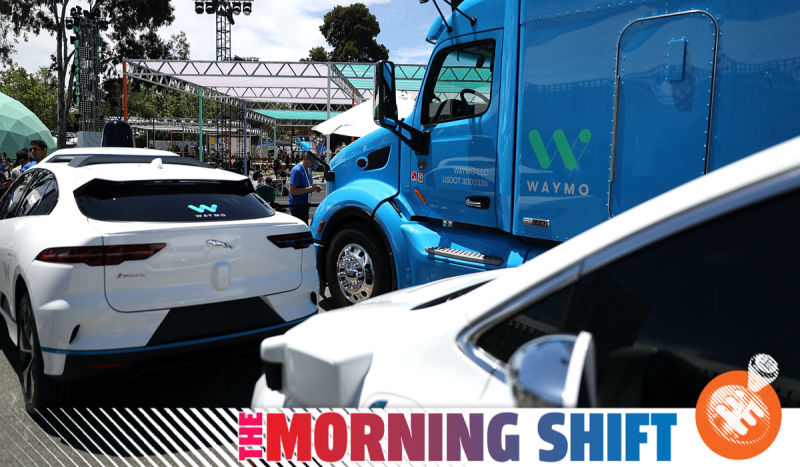
Yet another company partners with Google’s self-driving car division, AKA Alphabet’s self-driving car division, AKA Waymo; everyone seems to hate Trump’s new EPA rules; and supersonic jets. All that and more in the Morning Shift for June 20, 2019.
1st Gear: I Guess The Alliance Will Keep Doing Alliance-y Things
Renault-Nissan might be tearing at the seams as Nissan tries to escape, but for now, they’re still stuck together. And being stuck together means just going about your daily business, and in this case, the daily business is self-driving cars. So to further that end, Renault-Nissan are partnering up with Waymo, which if we’re being Very Official and Precise, is Alphabet’s self-driving car division, but which is pretty much known by every lay person as “oh, the Google car.”
Anyways, the new partnership seems aimed at the idea of a vast fleet of robotic vehicles, according to Reuters:
The initial agreement among Waymo, Renault and Nissan aims to “develop a framework for deployment of mobility services at scale,” according to Hadi Zablit, Renault-Nissan Alliance business development chief. Physical testing of vehicles and deployment of services would come in later phases.
The two automakers will set up 50-50 joint ventures in France and Japan to develop the driverless transportation services. Zablit said a later Waymo investment is “one of the options” under consideration.
Advertisement
The Ideas Men all seem to think this is the way of the future and the new public transit. Which, sure, we’ll see.
Renault-Nissan is just the latest company to partner with Waymo, after other companies like Jaguar Land Rover and Fiat Chrysler have already built a few vehicles with Waymo self-driving tech.
Advertisement
2nd Gear: Renault Refuses To Give Up Control Of Nissan
The Renault-Nissan partnership is lopsided, heavily biased in Renault’s favor, despite Renault being a much smaller company in terms of sales. Nissan is extremely mad about that, and Renault is extremely pleased, as one would expect. Nissan wants out. Renault does not. As one would expect.
Advertisement
A possible escape hatch for Nissan might have been a potential deal for a merger with FCA, but that was born and died pretty much instantly. So now what? Can Nissan still escape?
No, says the Renault CEO, reports Reuters:
As part of the fallout of the collapse of talks, Nissan is poised to urge Renault to significantly cut its 43.4 percent stake in the Japanese automaker, two people told Reuters.
“This is not at all our agenda,” Bollore told reporters in New Delhi on Wednesday when asked if Renault would reduce its stake in Nissan to get a deal with FCA.
“For us it is so important that we continuously improve our alliance. Not only for now, but also for the future and this is the mindset which we are in, and these are the discussions we have with our partners,” Bollore said after the global launch of Renault’s Triber crossover in India.
Advertisement
“You’re mine, ALL MINE, and you’ll NEVER ESCAPE,” Bollore was not reported to have added.
3rd Gear: The UAW Opposes Trump’s Fuel Economy Standards
President Donald Trump, with his strange obsession to undo literally everything President Barack Obama did before him, is desperately trying to roll back the Obama administration’s EPA fuel economy standards.
Advertisement
You would think automakers would dig that, but really, they don’t seem to care much what the standards are, as long as they’re consistent. So a huge swath of automakers—Ford, General Motors, BMW, Honda, Mazda, Nissan, Subaru, Toyota, and Volkswagen—got together to announce that they opposed Trump’s moves.
Advertisement
Trump, they said, is bad for business.
But what’s bad for business must be good for workers, right? That’s how the world works?
Advertisement
No, that is not how the world works, Reuters reports:
The United Auto Workers (UAW) will tell Congress on Thursday the union opposes the Trump administration’s proposal to freeze fuel efficiency requirements at 2020 levels through 2026, according to written testimony.
UAW Legislative Director Josh Nassar will tell two subcommittees of the U.S. House Energy and Commerce Committee that the union shares automakers’ concerns that the proposal “could lead to protracted litigation and uncertainty in the industry that will limit growth.”
The union represents workers at General Motors Co, Ford Motor Co and Fiat Chrysler Automobiles NV.
Advertisement
Oh.
Well, if the companies don’t like what Trump is doing, and the workers don’t like what Trump is doing, surely the third industry-side stakeholder, the oil companies, love what Trump is doing? I mean, someone has to, right?
Advertisement
Right???????
4th Gear: BP Opposes Trump’s Fuel Economy Standards
Oh:
BP PLC has urged the head of the U.S Environmental Protection Agency to keep working with automakers to improve vehicle fuel efficiency as the Trump administration considers freezing the requirements at 2020 levels, according to a copy of a letter seen by Reuters.
Advertisement
At this point, if the companies, the workers, and the oil companies oppose Trump’s fuel economy standards, then who are they for?
Do not say “consumers.” That makes no sense and you know it.
5th Gear: The FAA Wants To Make It Easier For Supersonic Passenger Jets To Come Back
Speaking of regulations, there are a ton of regulatory hurdles in the way if anyone wants to fly on a supersonic jet these days. Not only are you not allowed to go faster than the speed of sound over a populated area—because nobody really enjoys the boom shattering glass and whatnot—but supersonic jets have especially tight regulations over things like take off and landing noise.
Advertisement
That puts a damper on any supersonic jet development. So the FAA wants to ease things up a bit, according to the Wall Street Journal:
“Supersonic aircraft are back on the horizon,” acting Federal Aviation Administration chief Daniel Elwell said during a panel discussion. He predicted that the development work is likely to prompt research and design efforts outside the U.S. As a result, he said, today’s projects warrant eventually drafting new noise limits for the supersonic segment of flights.
But for now, the FAA is poised to propose first-of-their-kind noise standards targeting takeoffs and landings of supersonic aircraft during test flights. Such maneuvers can exceed current standards for comparably sized conventional aircraft operating around airports. Some of the proposed supersonic jetliners are projected to be about one-third longer than the roughly 120-foot length of an older Boeing Co. 737.
Based on size, the FAA wants to permit more takeoff noise for supersonic craft than would be allowed under existing standards, but in every case no more than is now permitted for the largest wide-body airliners.
Advertisement
But don’t think for a second that you, a peasant, will be riding on a supersonic jet anytime soon. Most of the projects in development are for private jets.
You, instead, will suffer. Slowly.
Has anyone flown Spirit lately?
Reverse: When Stealing A Car Is Objectively Good
On June 20, 1942, four people imprisoned in Auschwitz stole a car, and escaped. Good on them.
Advertisement
Neutral: Should We Even Bother With Supersonic Jets?
I mean, three hours to cross the Atlantic over six hours isn’t a huge deal. I actually like the nice break. It should be even longer, letting you get a proper night’s sleep. Yes, the take is hot, and I’m standing by it.















